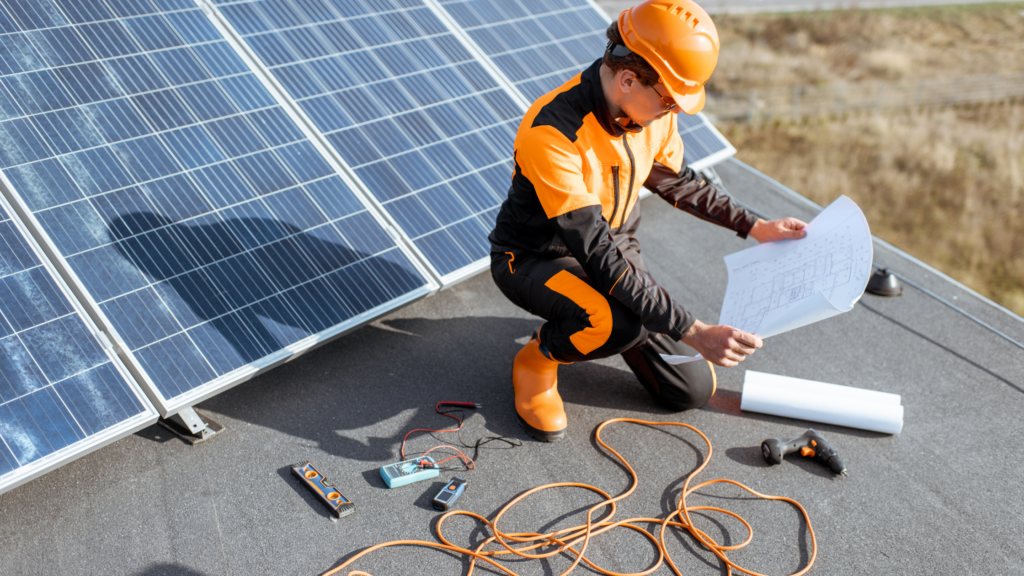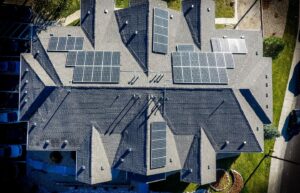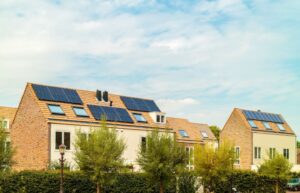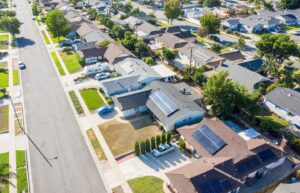Renewable energy, such as solar power stands out not only for its ability to harness the sun’s endless bounty but also for its significant environmental benefits. Yet, understanding and implementing this technology can seem like navigating uncharted waters.
Solar by Peak to Peak in Arvada, CO is guiding homeowners and businesses alike through the complexities of solar energy system installation. As pioneers in renewable solutions, our installers of solar energy systems illuminate the path toward a sustainable future, making the shift from conventional power sources not just a possibility but a seamless transition.
Understanding Solar Energy System Installers
ALT TAG: Installers of Solar Energy Systems: Your Definitive Companion in Arvada by Solar by Peak to Peak
Installer Duties
Solar energy system installers have a critical occupation in the renewable energy landscape. These workers start by assessing potential sites for solar installations. This involves considering sunlight exposure, space availability, and structural integrity. Their expertise ensures that each solar panel system maximizes its efficiency.
Following the assessment, they move on to the installation phase. Here, installers mount panels, connect electrical systems, and set up inverters. Each step requires precision to ensure safety and functionality.
Maintenance and repair work are also part of their responsibilities. Over time, systems may need adjustments or fixes due to wear or weather damage. Installers make sure these systems continue to operate at peak performance.
Lastly, occupations like these must navigate local building codes and safety standards meticulously during all projects. This ensures that installations meet regulatory requirements and protect homeowners.
Work Environment
The job takes them outdoors frequently, where they face varying weather conditions. Whether under the scorching sun or in cold breezes, their work goes on atop roofs or on ground mounts.
The physical demands are significant as well. Lifting heavy panels and equipment is routine work for them. Spaces can be tight, and heights can be daunting.
Yet with proper safety gear like harnesses and helmets, safety risks are significantly minimized.
Career Opportunities
In this field, growth opportunities abound for those eager to advance. Some may pursue project management roles within their companies—overseeing installations from start to finish—or transition into sales positions where they can leverage their technical knowledge.
Additionally, exploring opportunities in occupational employment within related industries can provide avenues for career progression and diversification.
Specialization offers another pathway forward, with options like commercial installations or working on large-scale solar farms gaining traction among professionals looking for a challenge.
With renewable energy’s rise globally comes an increased demand for skilled solar installers—a trend showing no signs of slowing down soon.
Education and Certification
Entry-level Requirements
Those looking to enter the solar installation field typically need a high school diploma or an equivalent. A background in electrical systems or construction is highly beneficial. Vocational training, especially courses focused on solar energy systems, can significantly enhance one’s qualifications.
Certification Guide
For installers of solar energy systems, obtaining certifications is not just about meeting requirements—it’s about standing out. Certifications like those from the North American Board of Certified Energy Practitioners (NABCEP) boost job prospects and credibility.
The certification journey involves passing exams and committing to continuing education to stay current in the rapidly evolving solar industry.
NABCEP Certification
The NABCEP certification holds great value for installers of solar energy systems. It sets a standard for knowledge, skills, and ethical practices. Eligibility hinges on specific educational backgrounds and work experience. Exam topics range from system design to safety protocols. Benefits include enhanced job opportunities and, often, higher pay rates.
The Future of Solar Energy System Installers
Job Outlook
The solar industry is on a rapid upward trajectory, thanks to the increasing adoption rates across residential, commercial, and industrial sectors. This surge is largely fueled by the global push towards clean energy, with governments worldwide implementing policies to support renewable energy expansion. These initiatives not only promise a greener future but also paint a bright job outlook for solar energy system installers.
Emerging technologies within the renewable energy sector are opening new career paths that didn’t exist a few years ago. Innovations in solar photovoltaic technology are particularly noteworthy, as they stand at the forefront of this transformation. As these technologies evolve, so does the demand for skilled professionals capable of navigating this complex landscape.
Employment Change Projection
Employment opportunities within the solar energy sector are also expected to increase significantly over the next decade. This projection is supported by statistics indicating an anticipated growth rate much higher than average across all industries.
The balance between technological advancements and market expansion plays a crucial role in shaping employment projections. While automation and efficiency improvements might reduce labor needs in certain areas, overall market growth driven by increased demand for clean energy solutions is expected to create more jobs than it displaces.
Global economic conditions also have a profound impact on renewable energy investments, thereby affecting job availability in this sector. Economic downturns may slow down investment flows temporarily; however, the long-term trend remains strongly positive due to widespread recognition of renewable energy’s benefits.
Financial Aspects of Installing Solar Energy Systems
Cost Considerations
The initial expense for installing solar energy systems comprises both equipment and labor costs. Prices can vary widely, depending on the size of the system and the complexity of the installation site.
Homeowners should consider the system’s size carefully. A larger setup will cost more, but it can also provide more savings in the long run. Site complexity, including roof condition or landscaping challenges, can also affect prices significantly.
To minimize expenses without sacrificing quality, homeowners can compare quotes from multiple installers and look for competitive pricing on equipment. They might also opt for less expensive components that still offer good performance and reliability.
Financing Options
Several financing options are available to help manage the costs when you’ve decided to install solar energy systems. These include loans, leases, and power purchase agreements (PPAs). Each option has its benefits and drawbacks, depending on individual circumstances.
Government incentives can greatly reduce upfront costs. In Arvada, CO, homeowners may qualify for federal tax credits covering 30 percent of their installation cost if they act soon; this rate is set to decrease after 2033. State rebates and local utility incentives can further lower expenses.
Consulting with a financial advisor is wise when navigating these options. They can help assess personal financial situations and choose a plan that maximizes benefits while minimizing out-of-pocket spending.
Installation Process Overview
Residential Services
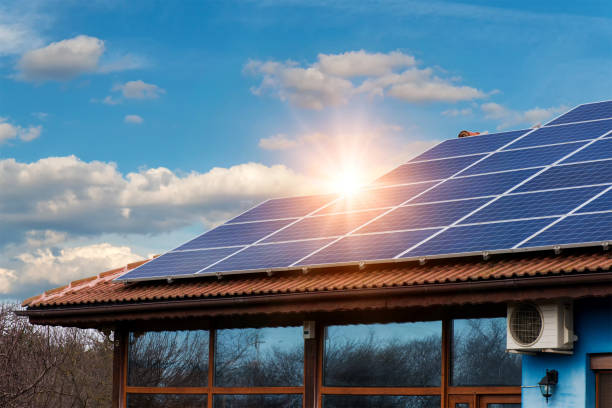
Solar installers offer a range of services to homeowners. They start with an initial assessment to determine the home’s suitability for solar energy. This includes analyzing the roof’s condition and orientation towards the sun. Installers also consider aesthetic preferences, ensuring panels complement the home’s design.
After installation, companies provide system monitoring. This ensures everything operates efficiently over time. Some go further by integrating battery storage or enhancing smart home connectivity. These additions boost energy independence and control.
Consultation Steps
The journey begins with a thorough consultation. Here, experts evaluate the site and assess your energy needs. They then propose a tailored system design that optimizes solar gain while considering your budget.
During this phase, consultants outline potential savings and return on investment (ROI). Understanding these figures helps homeowners make informed decisions about going solar.
Follow-up steps include detailed proposals and contract discussions. These ensure clarity and confidence before moving forward with installation.
Home Battery Systems
Integrating home battery systems offers significant benefits. It allows for energy storage, providing power during outages or peak tariff times. The most common batteries are lithium-ion due to their efficiency and lifespan advantages over lead-acid alternatives.
Selecting the right size is crucial; it should match your household’s energy consumption patterns. Installers can guide you through this process, ensuring your system meets both current and future needs.
Ownership and Equipment
Leased vs. Owned
Leasing or owning a solar energy system comes with its own set of financial implications over the system’s lifespan. Owning a system outright allows homeowners to claim tax credits and potentially increase their home’s value. They enjoy the full benefits of their investment, including lower electricity bills without additional lease payments.
On the other hand, leasing offers no upfront costs and includes maintenance coverage by lessor companies, making it an attractive option for those unwilling or unable to invest initially. However, lessees miss out on tax incentives and added home value. It is crucial to understand contract terms when considering leasing options, as they can vary widely in length and conditions.
Equipment Considerations
Selecting high-quality panels and inverters is essential for meeting your energy goals while staying within budget constraints. Compatibility between different components ensures optimal performance of the solar energy system. For example, certain inverters may only work effectively with specific types of panels.
Manufacturers often offer warranty periods as an indicator of product reliability. A longer warranty period usually signifies a more durable product that could provide better long-term savings and efficiency.
Incentives and Resources
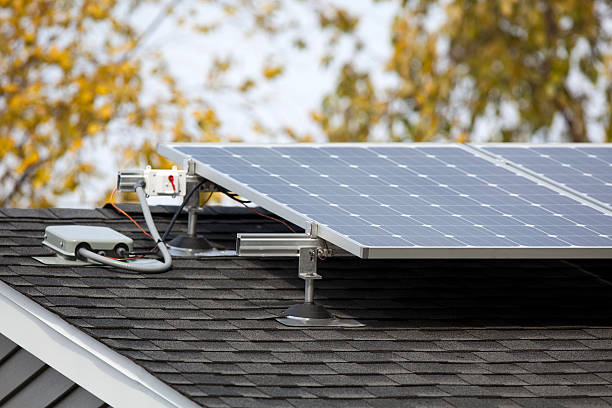
State Incentives
In Arvada, CO, homeowners looking to reduce their energy bills can take advantage of several state-specific incentives. These often include rebates or feed-in tariffs that significantly lower the initial cost burden of installing solar energy systems. It’s crucial for individuals to also explore local utility programs. They frequently offer additional incentives for adopting renewable energy sources.
For the most current information on available state incentives, homeowners should consult resources such as the Database of State Incentives for Renewables and Efficiency (DSIRE). This platform provides comprehensive details on various financial benefits across states.
Promotional Offers
While promotional offers can seem attractive, caution is advised. Some may conceal unfavorable terms within contract fine prints or warranties. It’s essential to read these details carefully before making any commitments.
Timing purchases around seasonal promotions can lead to substantial savings. Manufacturers and installers often offer discounts during specific times of the year. However, it’s vital to verify the legitimacy of these promotional offers through independent reviews or consumer protection agencies before proceeding.
Choosing a Solar Installer
Trustworthiness Factors
Selecting the right installers of solar energy systems involves more than just comparing prices. It’s crucial to ensure they have proper licenses, insurance, and bonding. These credentials safeguard homeowners from potential liabilities and substandard work.
One should also verify an installer’s reliability by checking references and reviewing their past project portfolios. This step reveals their quality of workmanship and customer satisfaction levels. Opting for installers who offer comprehensive warranties on their installations can provide long-term peace of mind.
Evaluation Criteria
When evaluating installers of solar energy systems, it’s essential to consider their experience with specific types of projects. Installers might specialize in either residential or commercial solar energy systems. Their expertise in one area may not necessarily translate to proficiency in the other.
Customer service practices are another vital consideration. Prompt responses to inquiries or concerns indicate a company values its clients highly. This responsiveness is especially important during the installation process and for any future maintenance needs.
Lastly, assess the post-installation support services available. Quality installers will offer guidance on system maintenance, monitoring solutions, and assistance with any operational issues that arise after installation.
Empower Your Home with Solar: Discover Solar by Peak to Peak’s Expertise in Renewable Energy!
Our team consists of highly skilled professionals. Solar by Peak to Peak brings a wealth of knowledge to every project. They ensure your solar energy system integrates seamlessly with your home’s architecture. This approach maximizes efficiency and aesthetics.
We prioritize ongoing training for our installers of solar energy systems. It keeps them at the forefront of solar technology advancements.
Quality Commitment
Solar by Peak to Peak stands out for its unwavering dedication to quality. We use only top-tier solar panels and components. Each installation undergoes rigorous testing. This ensures peak performance from day one.
Our commitment extends beyond the hardware. We strive for excellence in customer service, aiming for 100% satisfaction.
Proven Solar Installation Excellence
Diving into the world of solar energy systems is like stepping onto a path lit by endless possibilities. You’ve journeyed through the nuts and bolts of what it means to embrace solar power—from understanding the role of installers and navigating certifications to decoding financial benefits and installation processes.
It’s clear that solar isn’t just an energy choice; it’s a leap towards a sustainable future. With every panel installed, you’re not just powering your home; you’re joining a global movement towards cleaner energy.
Now, it’s your turn to shine. Don’t let the sun set on this opportunity. Empower your home with solar and take control of your energy destiny. With Solar by Peak to Peak’s installer of solar energy systems at your fingertips, transforming your roof into a powerhouse of sustainability is easier than ever.
Let’s harness the power of the sun together—reach out today and take the first step into a brighter, greener tomorrow.

